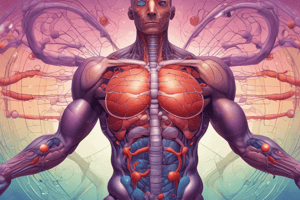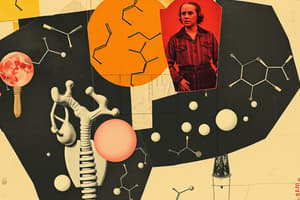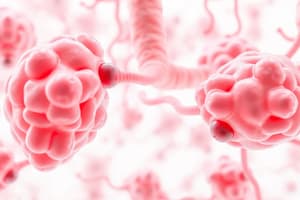Podcast
Questions and Answers
Which of the following are classes of hormones? (Select all that apply)
Which of the following are classes of hormones? (Select all that apply)
- Fats
- Steroids (correct)
- Monoamines (correct)
- Proteins and Peptides (correct)
What are the main sources of steroid hormone synthesis?
What are the main sources of steroid hormone synthesis?
Adrenal, gonads, and brain
All steroid hormones have the same chemical structure.
All steroid hormones have the same chemical structure.
True (A)
What is the main precursor for steroid hormones?
What is the main precursor for steroid hormones?
Steroid hormones are: (Select all that apply)
Steroid hormones are: (Select all that apply)
What type of effects can steroid hormones have without affecting gene expression?
What type of effects can steroid hormones have without affecting gene expression?
What are receptor isoforms?
What are receptor isoforms?
Protein and peptide hormones are: (Select all that apply)
Protein and peptide hormones are: (Select all that apply)
How are protein and peptide hormones released into circulation?
How are protein and peptide hormones released into circulation?
What types of hormones are derived from a single amino acid?
What types of hormones are derived from a single amino acid?
Which of the following is an example of a catecholamine?
Which of the following is an example of a catecholamine?
Flashcards are hidden until you start studying
Study Notes
Classes of Hormones
- Four primary classes: proteins and peptides, steroids, monoamines, and lipid-based hormones (prostaglandins).
Steroid Hormone Synthesis
- Main sources: adrenal glands, gonads, and brain.
- All steroid hormones feature a structure of three six-carbon rings and one five-carbon ring, consistent across all vertebrates.
- Variations exist among steroid hormones in the number and types of atoms attached to their rings.
- Steroids are derived from cholesterol, synthesized from acetate in the liver.
Steroid Hormones
- Fat soluble, allowing easy movement through cell membranes.
- Not water soluble; require carrier proteins for blood transport to target tissues.
- Receptors can be embedded in cell membranes or found in the cytosol/nucleus.
- Effects are slow to manifest but tend to last longer.
Non-genomic Effects of Steroid Hormones
- Steroids can induce rapid effects on neurons without altering gene expression.
- These effects modify neuronal excitability and involve membrane-bound receptors.
Receptor Isoforms
- Slight structural variations exist among hormone receptors, resulting in different functional properties.
Protein and Peptide Hormones
- Composed of amino acids, categorized as small peptides or larger proteins/polypeptides.
- Include neurohormones from the hypothalamus, tropic hormones from the anterior pituitary, and various hormones from the posterior pituitary, parathyroid, gastrointestinal tract, and pancreas.
Protein and Peptide Hormones (continued)
- Stored within vesicles in endocrine cells, released via exocytosis into circulation.
- Soluble in blood, eliminating the need for carrier proteins.
- Act quickly, with effects observable in seconds to minutes.
Protein and Peptide Hormone Receptors
- Located in the cell membrane, characterized by three domains: extracellular (hormone binding), transmembrane, and cytoplasmic.
- Utilize intracellular second messengers like cyclic AMP (cAMP) for signaling.
Monoamines
- Derived from single amino acids, classified into two types:
- Catecholamines: include epinephrine and norepinephrine produced in the adrenal medulla.
- Indole amines: include melatonin produced in the pineal gland.
- Thyroid hormones are also considered monoamines, as they are derived from the amino acid tyrosine.
Studying That Suits You
Use AI to generate personalized quizzes and flashcards to suit your learning preferences.




